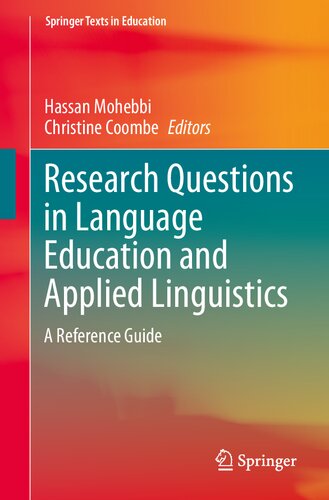

Most ebook files are in PDF format, so you can easily read them using various software such as Foxit Reader or directly on the Google Chrome browser.
Some ebook files are released by publishers in other formats such as .awz, .mobi, .epub, .fb2, etc. You may need to install specific software to read these formats on mobile/PC, such as Calibre.
Please read the tutorial at this link. https://ebooknice.com/page/post?id=faq
We offer FREE conversion to the popular formats you request; however, this may take some time. Therefore, right after payment, please email us, and we will try to provide the service as quickly as possible.
For some exceptional file formats or broken links (if any), please refrain from opening any disputes. Instead, email us first, and we will try to assist within a maximum of 6 hours.
EbookNice Team

Status:
Available4.7
39 reviewsThis volume encompasses the range of research questions on language-related problems that arise in language teaching, learning and assessment. The [150] chapters are written by experts in the field who each offer their insights into current and future directions of research, and who suggest several highly relevant research questions.
Topics include, but are not limited to: language skills teaching, language skills assessment and testing, measurement, feedback, discourse analysis, pragmatics, semantics, language learning through technology, CALL, MALL, ESP, EAP, ERPP, TBLT, materials development, genre analysis, needs analysis, corpus, content-based language teaching, language teaching and learning strategies, individual differences, research methods, classroom research, form-focused instruction, age effects, literacy, proficiency, and teacher education and teacher development.
The book serves as a reference and offers inspiration to researchers and students in language education.An important skill in reviewing the research literature is following a study’s “plan of attack.” Broadly, this means that before accepting and acting upon the findings, one considers a) the research question (Is it clear and focused? Measurable?), b) the subjects examined, the methods deployed, and the measures chosen (Do they fit the study’s goal and have the potential to yield useful results?), and c) the analysis of the data (Do the data lead to the discussion presented? Has the author reasonably interpreted results to reach the conclusion?). Mohebbi and Coombe’s book, Research Questions in Language Education and Applied Linguistics: A Reference Guide, helps budding researchers take the first step and develop a solid research question. As the field of language education evolves, we need continual research to improve our instructional and assessment practices and our understanding of the learners’ language learning processes. This book with its remarkable